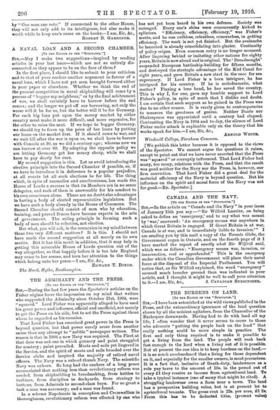THE ADMIRALTY AND THE PRESS.
LTO THE EDITOR OP THE "SPECTATOR."]
SIR,—During the last few years the Spectator's articles on the Fisher regime leave the impression on my mind that writers who supported the Admiralty since October 21st, 1904, were "squared." Lord Fisher was apparently alleged to have used his great power and influence, official and unofficial, not merely to get the Press on his side, but to set the Press against those whom he regarded as his enemies.
That Lord Fisher has exercised great power in the Press is beyond question, but that power surely arose from another cause than any attempt to " nobble " newspaper writers. The reason is that in 1904 a new Navy was required. The Fleet at that date was not one in which gunnery and paint struggled for mastery ; paint prevailed. Masts and sails yet lingered in the Service, and the spirit of masts and sails brooded over the Service clubs and inspired the majority of retired naval officers. The Navy was a rule-of-thumb Navy. The scientific Navy was unborn. So long had the cankers of a long peace accumulated that nothing less than revolutionary reform was needed, from shipbuilding to breadmaking, from kettles to turbines, from discipline to dockyards, from strategy to buttons, from Admirals to second-class boys. For so great a task a man was necessary; and a man was found.
In a scheme Napoleonic in conception and Cromwellian in thoroughness, revolutionary reform was effected by one who
has not yet been heard in his own defence. Society was outraged. Every one's shins were concurrently kicked to splinters. " Efficiency, efficiency, efficiency," was Fisher's motto, and he was ruthless, relentless, remorseless, in getting efficiency. The work is not yet finished. But the avalanche he launched is already consolidating into glacier. Continuity of policy reigns. Even common entry is no longer menaced. After lingering behind or imitating other nations for eighty years, Britain is now ahead and is original. The' Dreadnought' suspended European battleship-building for fifteen months, and destroyed the strategic advantage of the Kiel Canal for eight years, and gave Britain a new start in the race for sea supremacy. If Lord Fisher is a born intriguer, he has intrigued for his country. If he is melodramatic, what matter ? Playing a lone hand, he has saved the country. This is why I, for one, gave my humble support to Lord Fisher's policy, in spite of much that I dislike and doubt. I am certain that such support as he gained in the Press was due to no other reason. It is rarely given to contemporaries to measure the greatness of genius. Neither Dante nor Shakespeare was appreciated until a century had elapsed. Contrasting the Navy in 1904 and to-day, the silence of Lord Fisher under attack is explicable only on the theory that his
works speak for him.—I am, Sir, &c., ARNOLD WHIT'.
Windmill College, Farnham Common.
[We publish this letter because it is opposed to the views of the Spectator. We cannot argue the questions it raises, except to point out that we have never asserted that the Press was " squared" or corruptly influenced. That Lord Fisher had many, too many, relations with the Press, and that the result was good neither for the Navy nor the Press, is, however, our firm conviction. That Lord Fisher did a great deal for the material efficiency of the Navy is beyond question. But his influence on the spirit and moral force of the Navy was not for good.—ED. Spectator.]








































 Previous page
Previous page